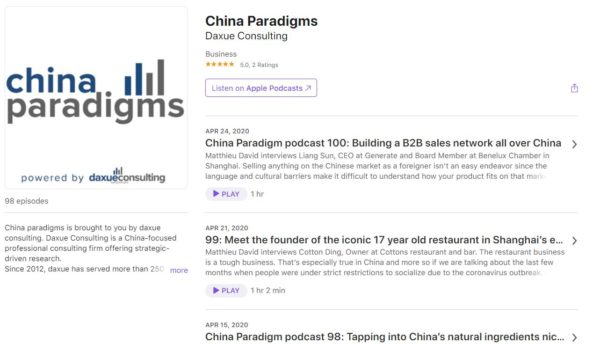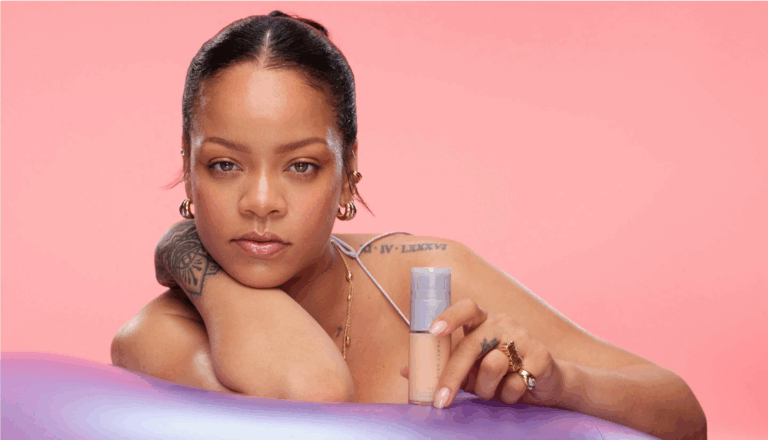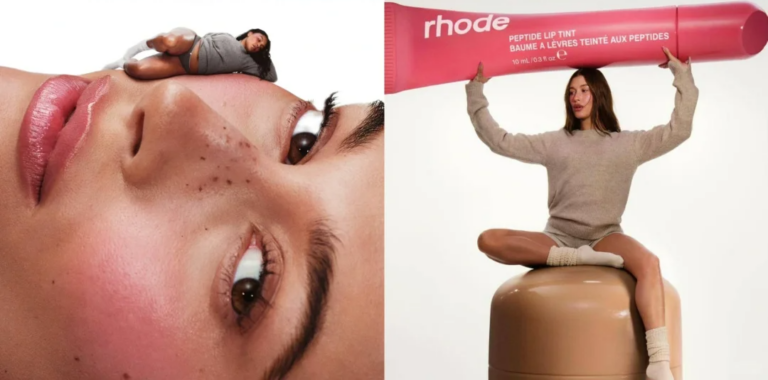Zhenyu Luo, the CEO of the top-performing Chinese online learning application, iGet (得到) said in his trending New Year’s speech, “you must run extremely fast to stay in the same place.” This sentence is a fitting description of the reality that is faced by an ordinary Chinese person today. A 2019 survey estimates that 16.6 percent of Chinese adults had experienced mental illness at some point in their lives; anxiety disorders being the most common. However, this may still be a quite conservative estimate due to the stigma around mental illness in China. Research also shows that the most anxious population is the urban middle class who have knowledge, information and ambitions, but lack financial resource and opportunities. The sources for stress in China lie in housing prices, appearances, education, marriage and career. This article will explore the stress that a typical urban middle-class Chinese family faces along with the consumption impact of stress.
Education stress in China
In China’s education system, Zhongkao (Senior High School Entrance Exam) and Gaokao (College Entrance Exam) are considered to be extremely important and even life changing. In this examination system, whether or not a student will be able to go to a specific school will be solely dependent on how well they score in comparison to their peers in the province. Unlike college entrance exams such as SAT and ACT in the United States, Zhongkao and Gaokao are single-attempt exams and are administered once a year. With over 10 million students sitting through Gaokao every year, exam preparation has become one of the highest stress factors for a Chinese family that has school aged children.
After-School tutoring both a solution and a cause
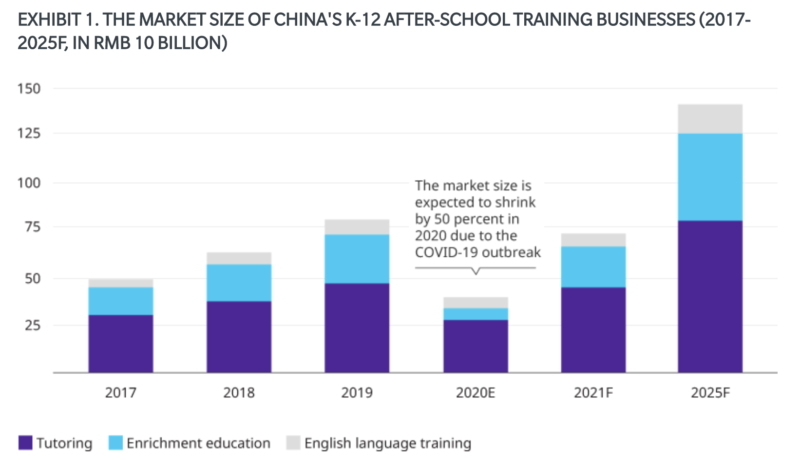
Source: K-12 after-school training ‘to business’ market set for rapid growth
The anxiety surrounding examination performance provides growth opportunity for the afterschool tutoring service market in China. Research from Frost & Sullivan shows that the Chinese K-12 after-school tutoring industry is quite fragmented with over 100,000 different service providers in China in 2017. In 2017, students in urban parts of China were averaging 10.6 hours of after-school tutoring per week. An increasing number of parents are turning to after-school tutoring as anxiety heightens, so the abundant consumer base makes analyst believe that by 2020, the market size would be over 500 billion RMB.
After-school tutoring places have implemented marketing campaigns that appeal to, or even elevate the anxiety of Chinese parents. Many advertisement flyers have used the catchphrases like “If you come, we will help prepare your kid; if you don’t come, we will help prepare your kid’s competitors,” or “Don’t let your child lose at the starting point.” These slogans highlight the element of “competition” in Chinese education system, evoking anxiety for a regular Chinese family.
Stress related to appearance
In early December, the topic #你有容貌焦虑吗?# (do you have social appearance anxiety?) was trending on Sina Weibo. The topic has more than 730 million views and 143 thousand discussions. From these discussions, it is evident that there is a significant emphasis on appearances for Chinese women. The ideal beauty standard for a woman in China is to have fair skin, V-shaped face, large eyes with double-eyelids and a slim body. Popular catchphrases like “好女不过百” (A good woman doesn’t exceed 50 kg) and “没有丑女人,只有懒女人” (there’s no ugly women, just lazy women) provoke anxiety and encourage females to work on their outer appearance. A quick search on Xiaohongshu shows that there are 5.4 million + posts regarding to “weight-loss” and 680 thousand+ posts regarding to “cosmetic surgery”. Overall, stress over appearance is contributing to the rapid growth in its plastic surgery, cosmetics and weight-control markets.
Appearance anxiety boosts the cosmetic surgery market
On Xiaohongshu, there are many KOLs who have tested out different cosmetic surgeries and share their experiences. Their captions and cover photos highlight the skin/appearance problems such as “Blackheads has found their enemies!”, “Monolids are the reason why you always look so tired” and “What to do with your black eyes?!” These captions remind viewers of the imperfections they may have and make them want to pay for cosmetic surgery to correct these problems. Through these stress-provoking messages, more and more Chinese people are turning to cosmetic surgery to fix their concerns about their appearances, creating over 15 million licensed procedures in 2017 with a yearly growth of 26.4%, and the number passed 20 million in 2018.
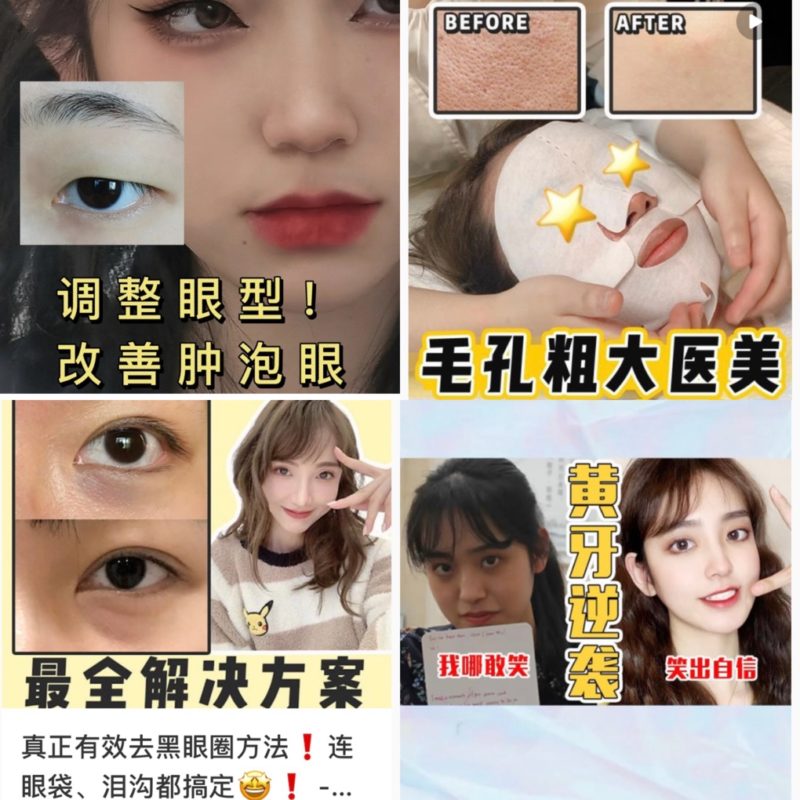
Source: Xiaohongshu, Samples of posts on Xiaohongshu regarding to cosmetic surgeries. Top left: Fix eye shape! Get rid of puffy eyes. Top right: Cosmetic surgeries for large pores, before and after. Bottom Left: The most effective ways to get rid of dark circles and eyebags! Bottom Right: Getting rid of yellow teeth, from being afraid to smile to smiling with confidence.
Work related stress in China
For Chinese adults, 30 is a particularly stressful age. Social media is filled with articles such as “10 things you must accomplish before turning 30” and “30 years old, have you succeeded?” Therefore, people began to associate 30 years old with the time to have a successful career, creating anxiety for people around that age.
Books on success, personal growth & career development cover a majority of book shelves
Research shows that books on 成功学 (Success, personal growth & career development) take up one third of the overall publishing business in China. Chinese people are known for their practicality in choosing books to read. The best-selling books are often related to investment and financial management, building interpersonal relationships, personal development and education. According to a survey, 72.7% of participants believe that people should read books that provide practical values and 54.2% of people believe that because of the rapid development in China, they must improve their skillsets through reading to keep up. Book stores, both online and offline, have caught on to this trend and tend to display more of these popular personal development books at storefront. In fact, 43.5% of the books displayed in Chinese airport bookstores are in the personal growth & career development category while Children’s books, novels and leisure magazines are the top-sellers in other nation’s airports.
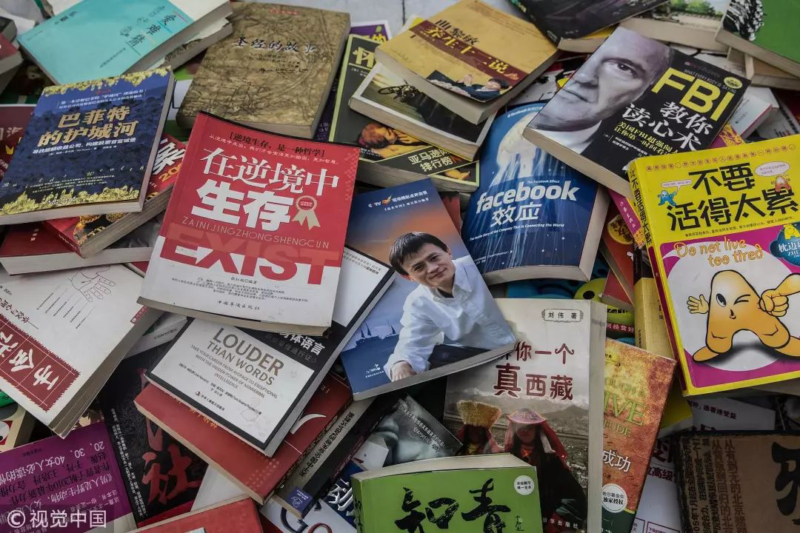
Source: Visual China Group, Photo taken from a street vendor selling stack of books on success stories, career advancement and personal development.
Marriage stress in China
A study done in 2018 shows that more than 80% of single Chinese young adults have been rushed by their parents to get married and 57% of these young adults believe that their parent’s attitude has caused significant stress. The Chinese culture continues to put a significant emphasis on family life despite the declining marriage rate in recent years. However, at the same time, the divorce rate is on the rise. Businesses have realized a potential in the dating/marriage market and began putting out mobile apps. These interfaces ask people to input details of personal information to allow a more efficient matching process.
Online dating apps as a solution to family pressure?
iResearch shows that in 2018, the national online marriage and dating industry market revenue was 4.99 billion yuan, and the penetration rate of the online marriage and dating industry in the overall marriage and dating market was 54.4%. It is estimated that by 2021, the online marriage and dating market will maintain a steady growth and total revenue will exceed 7 billion. In addition, online matching applications have integrated many interactive functions to appeal to China’s post-90s generation. For example, some applications allow users to live stream so that they could display themselves better. Users are also allowed to post short videos to display their hobbies and everyday life. Experts say that dating apps have seen significant growth in users after integrating these interactive options.
How do Chinese people prefer to de-stress?
From the above cases, it is evident that Chinese individuals and families are facing an increasing number of stressful situations in their daily lives. Therefore, they are also active in finding ways to release their stress and anxiety.
For example, market for meditation apps has been growing rapidly in China. At the end of 2018, sleep application “Xiaoshuimian” and “Knowyourself” both launched mini programs that provide guided meditations. Knowyourself’s mini program was used by 750 thousand people the day after it was launched. Many similar Chinese meditation applications are currently going through funding rounds.
De-stress Pop-up exhibition is also becoming a trend across tier 1 and tier 2 cities in China. These exhibitions allow visitors to participate in relaxing activities such as pillow fights, throwing things at a wall, screaming in a private room and hugging strangers. The tickets are constantly sold out and pop-ups in new cities are welcomed with long lineups on opening days.
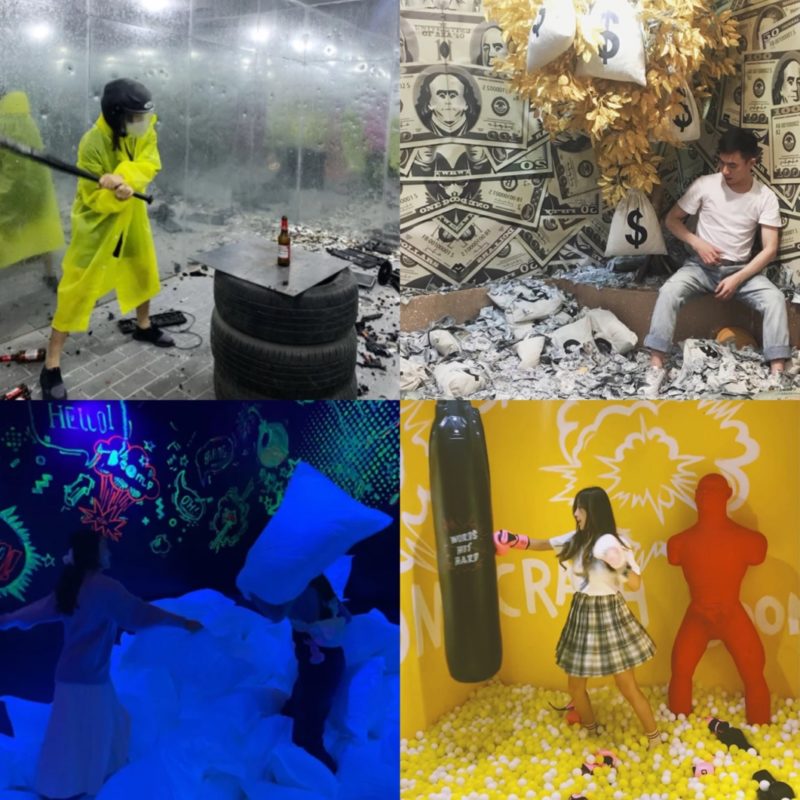
Source: Xiaohongshu , Samples of posts on Xiaohongshu of the different activities people could do at de-stress pop up exhibitions to release their stress.
Many Chinese are turning to sports and fitness to de-stress. Yoga in particular has reach new heights in tier-1 and 2 cities. Apps like Supermonkey and KEEP are spreading through the country.
What are some insights from examining the causes and impact of stress in China
- Many Chinese families are stressed about housing prices, appearances, children’s education, marriage arrangement and career; these stress bring business opportunities in markets like plastic surgery, cosmetics, books and online dating/matching apps.
- Social media is a major source of anxiety for young Many businesses have decided to post anxiety-provoking content so that the audience would want to purchase their product/service to alleviate the stress.
- Since there are so many stressful issues for an ordinary Chinese person, there are also plenty of opportunities open for businesses to focus on helping people to de-stress, unwind, and simply play.
Learn something new? Stay updated on the Chinese market by following our WeChat, scan the QR code below, or subscribe to our newsletter
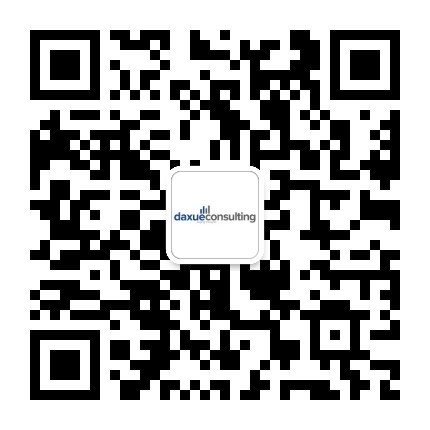
Learn how else Chinese maintain health from our report on the vitamin market
Listen to over 100 China entrepreneur stories on China Paradigms, the China business podcast
Listen to China Paradigm on Apple Podcast
